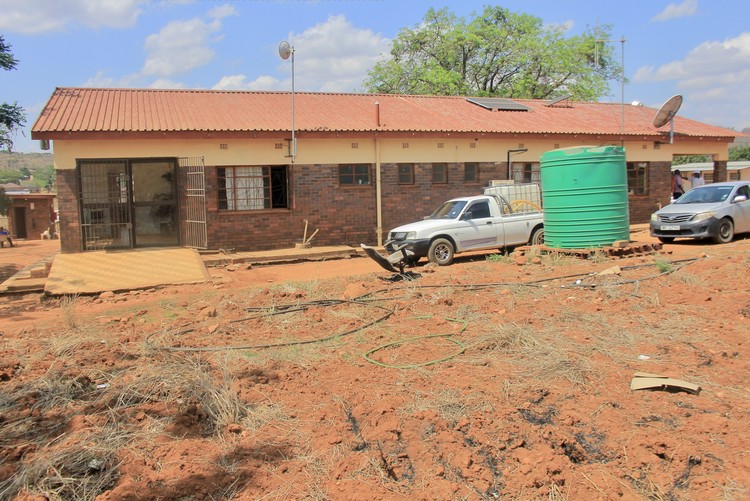
30 October 2025
Vyeboom Clinic has been without running water for nearly two years, leaving staff and patients to fetch water from home and use pit toilets. Photo: Thembi Siaga
Failure to successfully complete the multi-million-rand Malonga Water Reticulation Project has left at least seven villages and the Vyeboom Clinic in rural Limpopo near Vuwani without running water for nearly two years. Villagers buy water from neighbours with boreholes and push wheelbarrows with their containers.
The clinic borehole has been dry for two years, said resident Mpho Musera. He sometimes helps the clinic by buying water for its 5,000-litre tank.
A staff member, who asked not to be named, said hygiene and sanitation are severely compromised. “It is not easy to operate without running water,” they said.
“We have to bring water to the clinic to take our medication as we are here for hours,” said 70-year-old Magreth Mmuzhedzi. “We use our SASSA grants to buy water, but it is never enough for the month.”
Makondelela Murovhi, Vyeboom Community Organisation chairperson, said, “Pregnant women cannot give birth here. We may have to shut the clinic if the situation continues.”
“We need a permanent solution, not water tankers which came only after the media started asking the health department.”
The clinic has two flushing toilets, but without water these cannot be used. Instead staff and patients must rely on two pit toilets.
At Davhana, residents said some of the taps from the stalled water project have been stolen from their yards. The village depends on a single borehole, but it cannot meet the needs of the entire community.
“Paying R3 for just one container of water is too much. We are pleading with the government to help us with water,” said 75-year-old resident Monica Magoro.
Residents said water tankers are only sent occasionally and that the clinic was only supplied after we started asking questions.
“The Department of Health must drill a new borehole or arrange permanent water provision once the project is complete,” said municipal spokesperson Moses Shibambu.
He said other clinics in the district have functioning boreholes. Boreholes can dry up periodically, and water tankers remain an interim solution.
Neil Shikwambana, spokesperson for the Limpopo Department of Health, said the municipality has been supplying water with tankers.
“We are working on getting a new borehole in the nearby area, subject to availability of groundwater,” Shikwambana said.
The Malonga Water Reticulation Project to supply Vyeboom and surrounding areas started in 2017. According to a district municipality ad hoc report supplied to GroundUp by Shibambu, the project, managed by the technical services department, was to deliver bulk pipelines, bulk pumps, gravity mains, storage reservoirs, water reticulation, and yard connections across the Vhembe District.
The tender was R222-million, funded through a Municipal Infrastructure Grant. Five contractors and consulting engineers were engaged.
Defects on the Nandoni via Mavambe bulk line, which would supply the clinic, are being addressed by the Department of Water and Sanitation. Two concrete reservoirs were left unfinished in Nngwekhulu, and a bulk pipeline to an existing reservoir in Kurhuleni could not be installed, apparently due to “interference by community structures”. Pumps for new stations were not installed to prevent theft and vandalism, but are kept in safe storage.
A budget maintenance process was launched to rectify the situation. It included providing or refurbishing boreholes, water purification, and installing electrical and mechanical components at pump stations in Vyeboom and Tshimbupfe. The two 600kl concrete reservoirs at Nngwekhulu are also under construction.
Shibambu could not confirm how much has been spent overall. Mont Consulting Engineers, the project consultant, referred all questions, including those about the cause of the delays, back to the municipality.
The municipality highlighted challenges with MTTP Construction. “The contractor’s performance has been poor. They did not respond to requests for Central Supplier Database compliance intervention, and the general manager’s office could not reach them. The contractor has been notified of the municipality’s intent to terminate the contract,” reads the report.